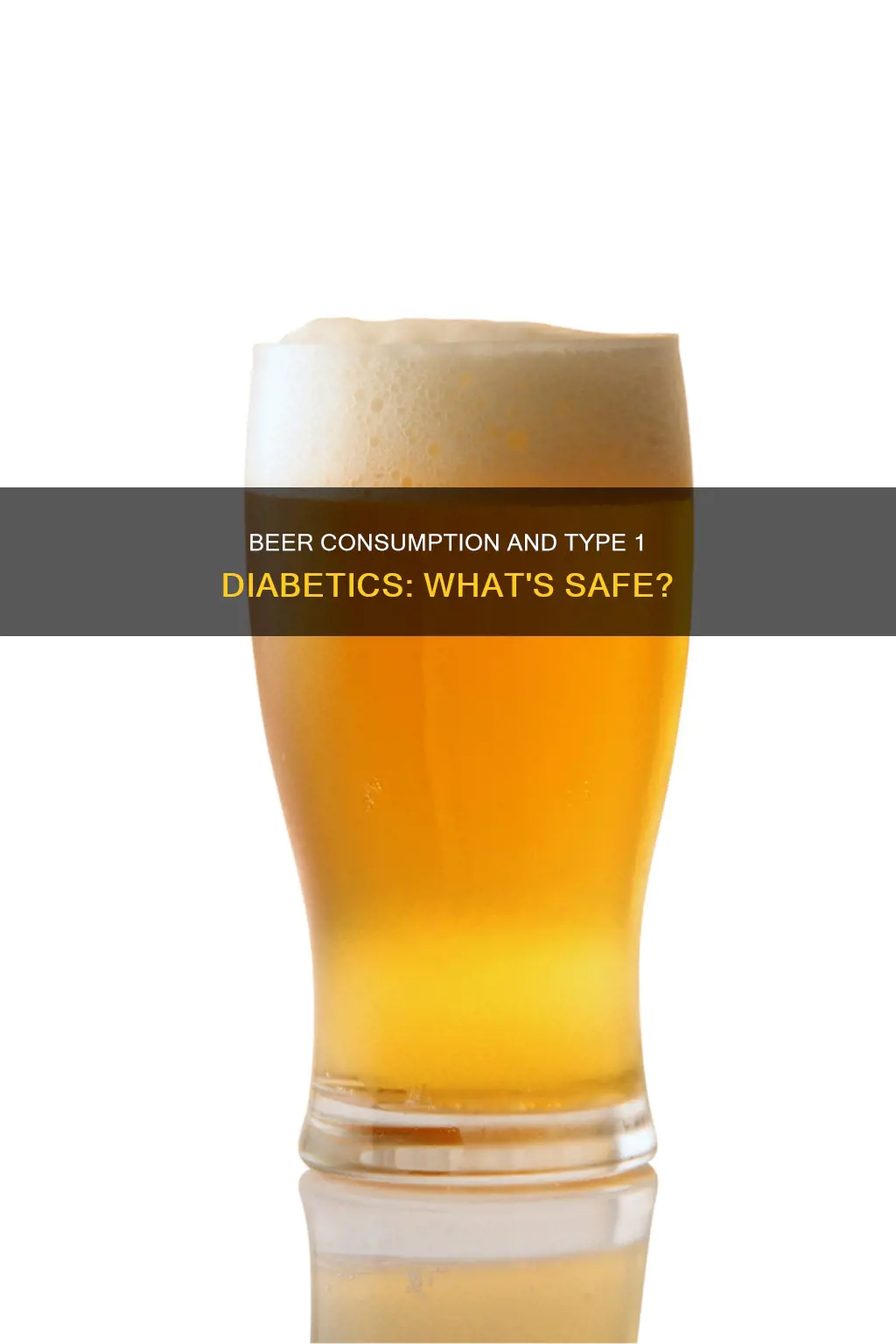
People with type 1 diabetes can drink beer, but there are some important safety considerations to keep in mind. Alcohol can interfere with the liver's ability to produce glucose, which can lead to dangerously low blood sugar levels, especially if the person is on insulin or other anti-hyperglycemic medications. It is recommended that people with type 1 diabetes do not drink on an empty stomach and that they monitor their blood sugar levels regularly before, during, and after drinking. Additionally, it is important to be aware of the calorie and carb content of alcoholic drinks, as they can affect weight and blood sugar levels. Moderate alcohol consumption, defined as up to 1 drink per day for women and up to 2 drinks per day for men, is generally considered safe for people with type 1 diabetes.
| Characteristics | Values |
|---|---|
| Alcohol consumption recommendations for type 1 diabetics | No more than one drink a day for women and up to two drinks a day for men |
| Definition of one drink | 12 fluid ounces (360 mL) of regular beer (5% alcohol) |
| "Binge drinking" | More than four drinks (for women) or five drinks (for men) within two hours |
| Safe alcohol alternatives for type 1 diabetics | Red wine, low-carb beers, distilled spirits, low-carb cocktails |
| Risks of drinking for type 1 diabetics | Hypoglycemia, interference with hypoglycemia recognition, weight gain, heightened risk for cancer, liver damage, nerve damage, etc. |
What You'll Learn

Alcohol intake recommendations for diabetics
If you have diabetes, it is important to be aware of how alcohol can affect your body and how to manage this. While drinking alcohol is not strictly off-limits for diabetics, it can be risky due to its impact on blood sugar levels. Alcohol can cause a surge in blood sugar levels, followed by a significant drop many hours later. This is because the liver, which normally releases stored glucose into the bloodstream, prioritises processing alcohol instead. Therefore, drinking alcohol can lead to hypoglycaemia (low blood sugar) and even diabetic ketoacidosis (DKA).
To prevent hypoglycaemia, it is recommended that you do not drink on an empty stomach. Eating a meal containing carbohydrates and fat/protein before drinking can help prevent an alcohol-induced hypo. It is also important to monitor your blood sugar levels before, during, and after drinking, as well as up to 24 hours later. The risk of hypoglycaemia can last for up to a day after drinking, and the symptoms of hypoglycaemia can be similar to those of drunkenness, so it is important to be vigilant.
In terms of specific drinks, beer tends to be higher in carbohydrates than other alcoholic drinks like wine or liquor. "Light" beers are the lowest in carbs, usually containing 5 grams or less per serving, and are also lower in alcohol content. Hoppy craft beers like IPAs and stouts tend to be much higher in carbs, typically containing 15 grams or more per serving. They are also higher in calories and alcohol content, so it is best to stick to just one serving.
When it comes to wine, red wine is generally considered to be the most diabetes-friendly due to its high antioxidant content. It has been linked to a reduced risk of heart disease and diabetes-related complications such as diabetic retinopathy. White wines, especially Champagne, can also have a low carb count, particularly dry and brut varieties.
Distilled spirits or hard liquors contain very few to no carbohydrates. However, they can lead to hypoglycaemia, especially when consumed on an empty stomach, as the liver cannot maintain basal blood sugar levels while metabolising alcohol.
Regardless of the type of alcoholic drink, it is important to drink in moderation. The American Diabetes Association (ADA) and the USDA guidelines recommend that men with diabetes limit themselves to two drinks per day, and women with diabetes limit themselves to one drink per day. Additionally, it is important to be aware of the other health risks associated with drinking, such as increased blood pressure, nerve damage, dehydration, and an increased risk of certain cancers and heart disease.
Ear Piercing and Beer: What's Safe?
You may want to see also

How alcohol affects blood sugar levels
Alcohol can affect blood sugar levels in people with diabetes, including Type 1 diabetes, in several ways. Firstly, the liver is responsible for releasing glucose into the bloodstream to maintain normal blood sugar levels. However, when you consume alcohol, your liver prioritises breaking it down over releasing glucose. This interruption in glucose release can cause a rapid drop in blood sugar levels, leading to hypoglycaemia. The risk of hypoglycaemia is further elevated for those taking insulin or certain diabetes medications, and when drinking without eating. Therefore, it is recommended to drink alcohol with food or a carbohydrate-rich snack.
Secondly, alcoholic drinks, particularly beer and sweetened mixed drinks, contain carbohydrates, which can raise blood sugar levels. Additionally, alcohol stimulates your appetite, leading to overeating and potential loss of control over blood sugar levels. Furthermore, alcohol can interfere with the effectiveness of diabetes medications, increasing the risk of hypoglycaemia or hyperglycaemia, depending on the medication and the amount of alcohol consumed.
Moreover, alcohol is calorie-dense, and these calories are stored in the liver as fat. Liver fat contributes to insulin resistance, resulting in higher blood sugar levels over time. Alcohol may also increase triglyceride levels and blood pressure, further impacting blood sugar management.
It is important to note that the effects of alcohol on blood sugar levels can be complex and vary depending on the amount and type of alcohol consumed, as well as individual factors such as medication use and eating habits. Therefore, it is always advisable to consult with a healthcare provider to understand how alcohol may affect your specific condition and to receive personalised recommendations for safe alcohol consumption.
Hot Beer: Is It Safe to Drink?
You may want to see also

The risks of drinking for type 1 diabetics
Drinking alcohol can be dangerous for people with type 1 diabetes. Alcohol can interfere with the liver's ability to manage blood sugar levels, which can lead to a hypo, or hypoglycaemia. This is where blood sugar levels drop too low, and it can be life-threatening. The risk of a hypo is increased if you drink on an empty stomach, and alcohol can also slow digestion, which affects how insulin acts on the body.
The symptoms of hypoglycaemia can look similar to those of drunkenness, such as drowsiness, unsteady movements, and slurred speech. This means that people around you might not realise that you need urgent medical attention. It is important to tell your friends about your diabetes and what to do if you have a hypo. You should also carry hypo treatments with you and wear medical ID.
Drinking can also affect your weight, as alcoholic drinks can be high in calories. Alcohol can also raise blood pressure, worsen neuropathy (nerve damage), cause dehydration, disrupt sleep, and increase the risk of certain cancers and heart disease.
It is important to monitor your blood sugar levels regularly if you are drinking, and to be aware of how much alcohol you are consuming. The American Diabetes Association (ADA) recommends that men with diabetes limit themselves to two drinks a day, and that women with diabetes limit themselves to one drink per day. These are the same as the USDA guidelines for people without diabetes.
Beer and Milkshakes: Mixing Drinks, Safe or Not?
You may want to see also

Avoiding hypoglycaemia when drinking
Drinking alcohol can affect your blood sugar levels, and it can be particularly dangerous for people with type 1 diabetes. Hypoglycaemia, or low blood sugar, can be life-threatening and requires immediate treatment. Here are some tips for avoiding hypoglycaemia when drinking:
Eat Beforehand
Eating before drinking is crucial, especially for people with diabetes. Drinking on an empty stomach can cause hypoglycaemia because your liver will struggle to release glucose into the bloodstream. Eat a meal with carbohydrates before drinking, and keep snacks with you in case your blood sugar drops.
Monitor Blood Sugar Levels
Continuously monitor your blood sugar levels before, during, and after drinking. This is important for people with diabetes, as alcohol can affect blood sugar levels for several hours. If you notice a sudden change, stop drinking and seek medical attention.
Choose Your Drinks Wisely
Beer is typically higher in carbohydrates than other alcoholic drinks like wine or liquor. Opt for "light" beers, which have fewer carbs, or choose red wine, which is associated with health benefits for people with diabetes when consumed in moderation. Avoid sugary drinks and mixers, as they can cause your blood sugar to spike and then dip to dangerously low levels.
Drink in Moderation
Moderate alcohol consumption is generally considered safe for people with diabetes. Stick to the recommended limits: no more than one drink per day for women and no more than two drinks per day for men. "Binge drinking" is strongly discouraged.
Be Prepared
Always carry your diabetes kit and hypo treatments with you. Inform your friends about your diabetes and what to do if you have a hypo. Keep glucose tablets on hand to quickly boost your blood sugar if needed.
Stay Hydrated
Drink plenty of water when you get home, and continue to monitor your blood sugar levels. If you experience a hypo, treat it before you go to sleep.
The Magic of Beer Widgets: How Do They Work?
You may want to see also

What to eat and drink to avoid a hypo
People with type 1 diabetes can drink beer, but there are some safety considerations to keep in mind. Firstly, it is important to monitor your blood sugar levels regularly when drinking, as alcohol can interfere with your liver's ability to produce glucose, potentially leading to hypoglycemia. To avoid this, don't drink on an empty stomach. Eating foods containing carbohydrates, such as a sandwich, before drinking can help prevent a hypo. It is also important to continue monitoring your blood sugar levels for up to 24 hours after drinking.
- Eat a nutritious meal before drinking: Opt for foods rich in protein, such as eggs, salmon, chicken, or Greek yogurt. These foods can help slow the absorption of alcohol and keep you feeling fuller for longer, reducing the risk of alcohol-induced food binges.
- Choose your drinks wisely: Opt for light beers, which have fewer carbs and a lower alcohol content. If you choose to drink wine, stick to red or white wine, as they have a lower sugar and carb content than dessert wines. When it comes to liquor, avoid mixing it with sugary juices or soda, as this can cause a spike and then a dip in blood sugar levels.
- Pace yourself: Limit yourself to no more than one drink per hour and no more than three to four drinks for the day. This will help you stay within the recommended alcohol consumption guidelines and lower the risk of hypoglycemia.
- Stay hydrated: Drink plenty of water alongside your alcoholic beverages to stay hydrated and reduce the risk of a hangover.
- Carry snacks: Make sure you have snacks with you, especially if you're planning on dancing or walking around, as these activities can cause your blood sugar levels to drop.
- Treat hypos promptly: If you experience a hypo, treat it immediately, even if it occurs at night before you go to bed.
Breastfeeding and Beer: Is Half a Beer Safe?
You may want to see also
Frequently asked questions
Yes, type 1 diabetics can drink beer, but it is important to be aware of how alcohol affects your body and how to manage this.
Drinking beer can increase the risk of hypoglycemia because alcohol interferes with your blood sugar levels. It can also affect your weight due to the high calorie content of some alcoholic drinks.
The general alcohol consumption recommendation for people with diabetes is the same as for the general population: no more than one drink per day for women and up to two drinks per day for men.
It is important to not drink on an empty stomach, to pace yourself, and to monitor your blood sugar levels regularly before, during, and after drinking.
"Light" beers tend to be lower in carbs, calories, and alcohol content, so they may be a better option for people with diabetes. However, it is important to check the nutrition information for specific beer brands as the carb and calorie content can vary widely.







